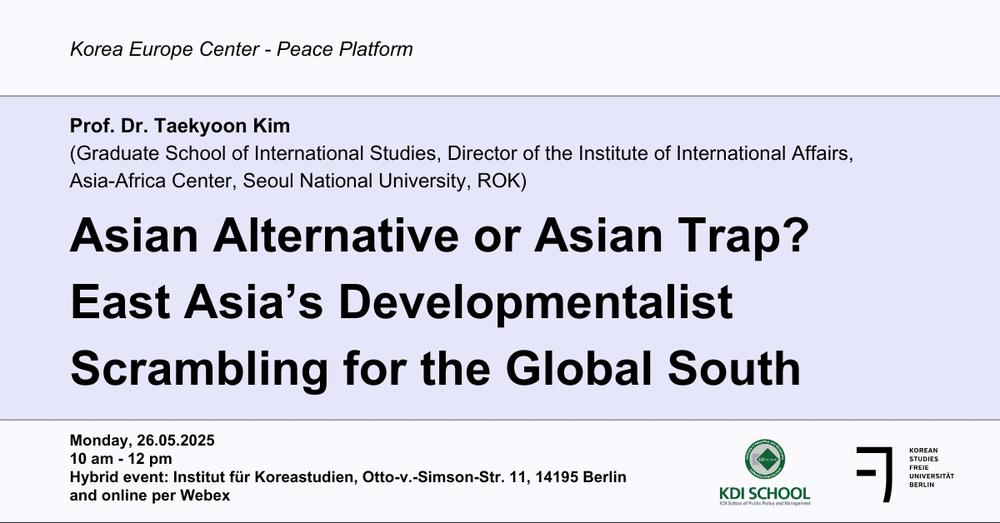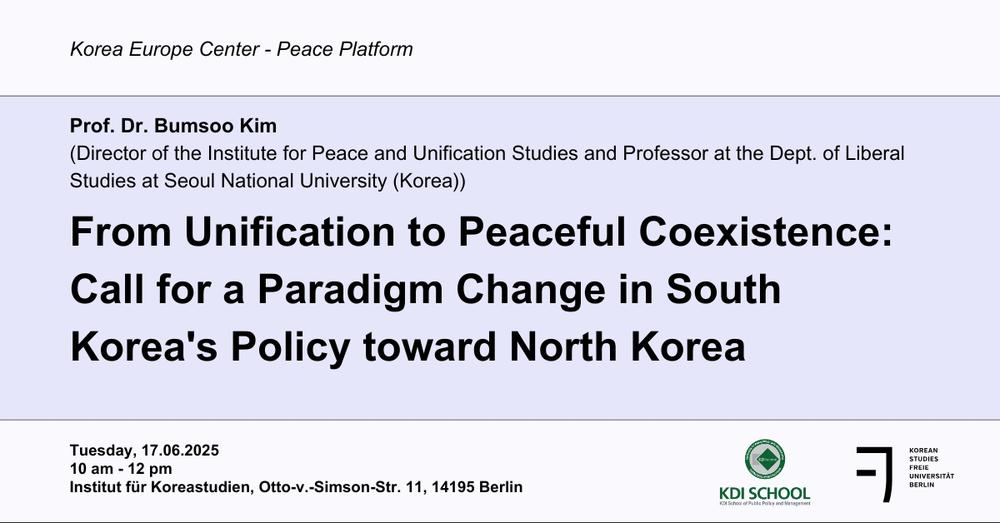KEC Peace Platform 2025
26.05.2025
This forum provides a venue for multifaceted analysis and in-depth discussion to foster cooperation between South Korea and Europe in times of heightened uncertainties by exploring diplomatic strategies to mediate conflicts, facilitate effective crisis management, and foster sustainable peace on the Korean peninsula.
1) 26 May 2025
Asian Alternative or Asian Trap? East Asia’s Developmentalist Scrambling for the Global South
Prof. Dr. Taekyoon Kim (Graduate School of International Studies, Director of the Institute of International Affairs, Asia-Africa Center, Seoul National University, ROK)
Lecture
Under the condition that the Global West’s hegemonic leaderships on international development have been diminishing, and the Global East – China and Russia – have been playing a significant role in replacing the former, East Asian donors – mainly, China, Japan and South Korea – will receive much more attentions from the Global South as ‘alternative’ partners who Southern states are able to trust and cooperate for their development plans. However, it is worthwhile to identify and explore a toxic concept of ‘Asian traps’ that are anchored in East Asia’s developmentalism-obsessed aid policies, with the particular reference to three Asian donors – China, Japan, and South Korea. Through their historical paths of modernization, three donor countries commonly share the state-led economic growth strategies in accordance with the developmental state thesis, albeit differently applied. The developmental state in East Asia not only justified the embedded symbiosis between governments and non-state actors – particularly, business sector – by emphasizing economic development as nation’s top priority, but also overshadowed democratic transitions as the secondary concern of the state. Legacies of East Asia’s developmental approach to economic modernization have been deeply entrenched as a strategic backbone of three Asian donors’ developmentalist foreign assistance policies towards the Global South, which would create the root cause of Asian traps.
Such a notion of Asian traps, which are riveted heavily to donors’ high-cost infrastructure projects for recipient partners in the form of tied aid, has often ended up triggering debt crises against partner countries of the Global South. It is worthwhile to note that Asian traps, despite the variation of its significance across China, Japan and South Korea, are commonly characterised by mercantile and commercialised profiles which have been developed under the vestige of the developmental state. The four generics of Asian traps include: the preference of concessional loans for infrastructure; low level of aid transparency; high level of tied aid; and the inclination to implement aid projects via bilateral channels. Those developmentalist tenets of three Asian donors come up with the sequence of events leading up to debt crises: increasing contracts with donors’ suppliers and private sector; discouraging private engagements of partner countries into development-related projects; promoting competitions and dampening aid coordination among donors; and thereby pushing recipient partners into the trap of debt crises.
In this regard, the study aims to compare three Asian donors’ developmentalism-centred aid strategies by investigating ‘Asian trap’ in two ways: first, tracing the commercialised patterns of the development state in the field of development aid across China, Japan and South Korea; and second, focusing on the fragmentation and competition by three Asian donors’ developmentalist scrambling for the Global South.
About the lecture
Taekyoon Kim is professor of international development at the Graduate School of International Studies, and director of the Institute of International Affairs as well as Asia-Africa Center, Seoul National University (SNU). He is currently vice president of the Korea Association of International Development and Cooperation (KAIDEC), and advisory committee member of the Korea International Cooperation Agency (KOICA). He served as consultant for the UNESCO and the UNRISD, as policy advisor for the Ministry of Foreign Affairs, as member of the Prime Minister Office's Committee on International Development Cooperation, as visiting fellows for the Woodrow Wilson International Center for Scholars and the Institute of Development Studies (IDS) at the University of Sussex, and so forth. His main academic research areas include international development, global governance, Global South studies and international political sociology. He published many articles to academic peer-reviewed journals such as International Sociology, Journal of Democracy, Global Governance, International Relations of the Asia-Pacific, European Journal of Development Research, and Oxford Development Studies, and also published a number of books, including The Korea State and Social Policy (Oxford University Press), and After Bandung: The International Political Sociology of the Global South (Jininjin). He received D.Phil. from the University of Oxford and Ph.D. from the Johns Hopkins School of Advanced International Studies, and took the other academic positions such as visiting professor at the University of Paris IV (Sorbonne), and assistant professor at Waseda University and Ewha Womans University.
2) 17 June 2025
From Unification to Peaceful Coexistence: Call for a Paradigm Change in South Korea's Policy toward North Korea
Prof. Dr. Bumsoo Kim
(Director of the Institute for Peace and Unification Studies and Professor at the Dept. of Liberal Studies at Seoul National University (Korea))
Lecture
This lecture examines the ROK’s policy toward North Korea and calls for a paradigm shift in the ROK’s North Korea policy—from unification to peaceful coexistence. Since the division of the Korean Peninsula in 1948, unification has been considered the ultimate goal of the ROK’s policy toward North Korea. For instance, the Syngman Rhee government advocated for the “unification of the Korean Peninsula by military attack on North Korea,” denying North Korea’s statehood and legitimacy. It argued that “the ROK government is the only legitimate and lawful government on the Korean Peninsula recognized by the United Nations (UN).” From Syngman Rhee’s perspective, North Korea was merely a rogue regime that had illegally occupied territory belonging to the ROK, as defined in the Constitution as including “the Korean Peninsula and its adjacent islands.” In this context, North Korean territory was seen as an area that the ROK would eventually reclaim and unify by absorption.
This official stance of the Syngman Rhee government has been consistently upheld by successive governments, even to this day. Despite numerous constitutional amendments and regime changes, the current Constitution—amended in October 1987—not only retains the territorial provision (Article 3), which states that “the territory of the Republic of Korea shall consist of the Korean Peninsula and its adjacent islands,” but also newly added Article 4, stating that “the Republic of Korea shall seek unification and shall formulate and carry out a policy of peaceful unification based on the principles of freedom and democracy.” This makes it clear that unification is a constitutional value to which the Republic of Korea should aspire.
These days, however, negative perceptions regarding the necessity of unification are rapidly increasing in South Korea. Moreover, in December 2023, North Korean leader Kim Jong-un announced that relations between South and North Korea are no longer those of kindred nations, but rather hostile relations between two states at war, and declared that unification is no longer a national goal of the DPRK. Under these circumstances, this lecture calls for a paradigm shift and argues that peaceful coexistence should take precedence over unification in the ROK’s policy toward North Korea.
About the lecture
Professor Bumsoo Kim received his B.A. and M.A. from the Department of International Relations at Seoul National University in 1992 and 1997 respectively, and his Ph.D. in Political Science from the University of Chicago in 2006. Since then, he has worked as a research professor in the BK Program of the Department of Political Science at Seoul National University and as a lecturer at Seoul National University, and since 2010, has been a professor in the College of Liberal Studies (CLS) at Seoul National University. In the College of Liberal Studies, he served as an associate dean twice (2012-2014 and 2017-2019), and since February 2023, has been serving as a Dean. At the Institute for Peace and Unification Studies (IPUS), he served as a chief of External Relations Division, head of the Center for Unification Studies, and deputy director from 2016 to 2023, and since March 2023 has been serving as a director. He has also served as a researcher at the Institute of Social Sciences at the University of Tokyo and a visiting professor at the University of Washington, U.S.A. He has served as a vice president of the Korean Political Science Association, a research board member of the Korean Association of International Studies, a president of the Governance Research Association, and a consultant for university restructuring at the Ministry of Education. As of March 2023, he is a member of the Academic Council of Seoul National University and an advisory board member of the Overseas Koreans Foundation.
His main research interests include political theory such as theory of justice and freedom, human rights theory, peace theory, nationalism, and multiculturalism. He has published many books in Korean, including What Is Fairness in Korean Society: 7 Theories of Justice to Protect a Fair Me (Akanet, 2022); What Is Peace Studies: Genealogy and Issues (Seoul National University Press, 2022); Korea-Japan Relations: Beyond Conflict to Reconciliation (Parkmun Press, 2021). He has also published many articles in peer-reviewed journals, which include “Bringing Class Back In: The Changing Basis of Inequality and the Korean Minority in Japan,” Ethnic and Racial Studies, 31(5), 2008, pp. 871-898; “Are North Korean Compatriots ‘Korean’? The Trifurcation of Ethnic Nationalism in South Korea during the Syngman Rhee Era (1948-1960),” Journal of Korean Studies, 24(1), 2019, pp. 149~171; “Are the Freedom of States and International Public Laws Compatible? Kant’s Theory of Peace and the Freedom of States” Korean Journal of International Relations, 59(3), 2019, pp. 7-54. In 2009, he received the Best Article Award of the Korean Political Science Association for his article “Who Is Japanese? the Boundaries of the ‘Japanese’ in Post-War Japan,” published in Journal of the Korean Political Science Association, 43(1), pp. 177-202.


